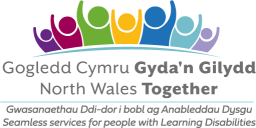Accommodation options
In North Wales, people with learning disabilities live in lots of different types of accommodation, including:
- Living with family and friends
- Living in a shared house with other people with learning disabilities, supported by a team of staff (we call this community living)
- Living in a flat or house of their own (that they own, or that rent from social landlords or the private sector)
- Living in someone else’s home (where this has been arranged by the Council, we often call this ‘Shared Lives’
- Living in a care home
- Living in a foster home
- Other temporary settings, including hospitals and prison
Here you can find the numbers of types of accommodation/placements where adults with learning disabilities live across Wales.
It is important that people with learning disabilities are able to get the accommodation and support that best suits their needs, in their local area.
Resettlement and living closer to home
Over the past 35 years the number of people with learning disabilities living in care homes and hospitals has gone down. This is because Councils and the Health Board have been working hard to help people to move out of long stay hospitals, and trying to avoid moving people in to care homes. They have also tried to make sure that more people can be supported closer to home. To do this, Supported Living and other housing options have been developed all over North Wales.
But across North Wales, 180 people with learning disabilities are still living in registered care homes that are not in their home county (we call these ‘out of county placements’). We need to keep working with Councils, Health and housing and support providers to change this.
Bryn Y Neuadd
Shared Lives
Shared Lives is another option that can work really well for short or long-term accommodation with support. In Shared Lives, individuals or families who have a spare room a short or long-term home, with support, to people with learning disabilities.
You can also contact your Local Council if you have a spare room and you might be interested in offering a Shared Lives placement.
Any time a person chooses to share with others (for example in community living or shared lives), it is important that people are ‘matched up’, based on their personalities, needs and wants. This should be done by involving all of the people who are going to live together, and by making sure that there is an advocate involved.
Check out this video about some experiences about Shared Lives.
Check out this video about some experiences about Shared Lives.
Meet The Buyer Event
Meet the Buyer Event via Zoom.
Event is separated into 2 videos. Please view both videos for the whole event.


